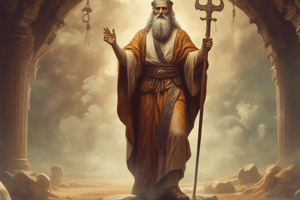Podcast
Questions and Answers
Who dedicated Samuel to the Lord’s service after praying for a child?
Who dedicated Samuel to the Lord’s service after praying for a child?
- Hannah (correct)
- Eli
- Saul
- David
What significant role did Samuel have in the transition from judges to monarchy in Israel?
What significant role did Samuel have in the transition from judges to monarchy in Israel?
- He led military campaigns against the Philistines.
- He built the first temple in Jerusalem.
- He established the system of judges.
- He anointed the first two kings of Israel. (correct)
What was a major consequence of King Saul's actions as experienced by Samuel?
What was a major consequence of King Saul's actions as experienced by Samuel?
- Samuel was rewarded for his loyalty.
- Samuel gained a personal kingdom.
- Saul captured the Ark of the Covenant.
- Saul's disobedience led to God's rejection of him. (correct)
Which of the following best describes Samuel's approach to spiritual leadership?
Which of the following best describes Samuel's approach to spiritual leadership?
What do the books of 1 Samuel and 2 Samuel primarily portray about Samuel's legacy?
What do the books of 1 Samuel and 2 Samuel primarily portray about Samuel's legacy?
Flashcards are hidden until you start studying
Study Notes
Samuel in the Bible
- Identity: Samuel is a key prophet and judge in the Old Testament.
- Birth: He was born to Hannah, who was initially barren, after she prayed for a child.
- Dedication: Hannah dedicated Samuel to the Lord’s service, and he was raised in the temple by Eli, the high priest.
Roles and Contributions
-
Prophet:
- Anointed the first two kings of Israel: Saul and David.
- Acted as a mediator between God and Israel, delivering divine messages.
-
Judge:
- Led Israel during a transitional period from theocracy to monarchy.
- Provided leadership in times of crisis, helping to rally the Israelites against their enemies.
-
Spiritual Leader:
- Called for the people to repent from idolatry and return to God.
- Established a cycle of renewal and revival in Israel.
Major Events
-
Anointing of Saul:
- God instructed Samuel to anoint Saul as the first king of Israel, marking the transition from judges to kings.
-
Rejection of Saul:
- Samuel anointed David after God rejected Saul due to his disobedience.
-
David's Rise:
- Guided David early in his life, advising him during his rise to kingship.
Legacy
-
Books of Samuel:
- His story is primarily told in the books of 1 Samuel and 2 Samuel in the Bible.
-
Symbol of Leadership:
- Represents the importance of prophetic leadership and the consequences of disobedience to God’s commands.
-
Covenant:
- His life and actions highlight the covenant relationship between God and Israel, emphasizing faithfulness and repentance.
Identity
- Samuel is a significant prophet and judge in the Old Testament of the Bible.
- His birth occurred after his mother, Hannah, made a heartfelt prayer for a child despite her barrenness.
- Dedicated to the Lord's service, Samuel was raised by Eli, the high priest, in the temple.
Roles and Contributions
-
Prophet:
- Anointed the first two kings of Israel: Saul and David, showcasing God's direction in leadership.
- Functioned as a mediator between God and the Israelite people, delivering crucial divine messages and guidance.
-
Judge:
- Provided leadership during Israel's transition from a system led by judges to a monarchy, exemplifying adaptability.
- Played a vital role in rallying the Israelites during crises, demonstrating his military and strategic leadership against enemies.
-
Spiritual Leader:
- Urged the Israelites to repent from idol worship and return to their covenant with God, fostering spiritual renewal.
- Allowed for a cycle of revival within Israel, contributing to their spiritual and moral restoration.
Major Events
-
Anointing of Saul:
- God commanded Samuel to anoint Saul as Israel's first king, marking a significant political shift from judgeship to kingship.
-
Rejection of Saul:
- Following Saul's disobedience, God rejected him as king and directed Samuel to anoint David, illustrating divine judgment.
-
David's Rise:
- Provided crucial guidance to David during his early life, influencing his leadership and kingship journey.
Legacy
-
Books of Samuel:
- Samuel's life and contributions are chronicled in the books of 1 Samuel and 2 Samuel, which reflect his significance in biblical history.
-
Symbol of Leadership:
- Represents the necessity of prophetic leadership and serves as an example of the severe consequences of straying from God's commands.
-
Covenant:
- His experiences highlight the covenant relationship between God and Israel, emphasizing themes of faithfulness, repentance, and divine expectation.
Studying That Suits You
Use AI to generate personalized quizzes and flashcards to suit your learning preferences.




